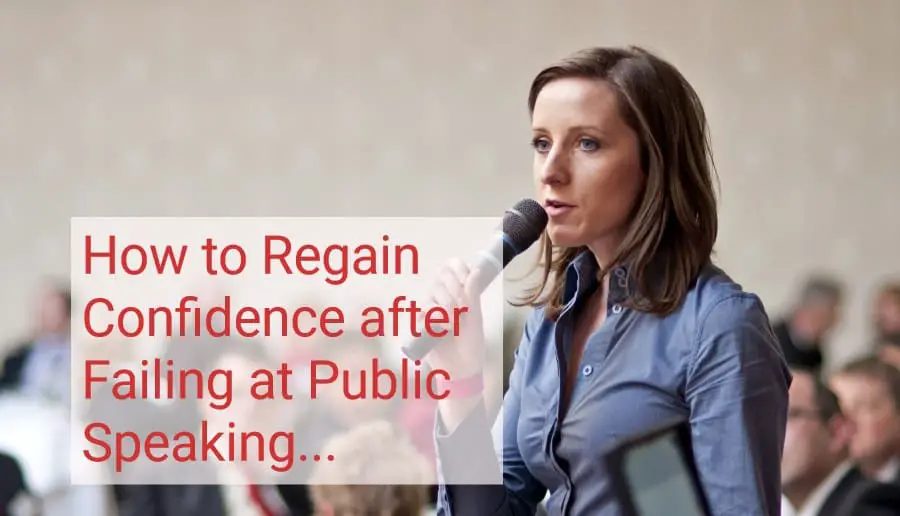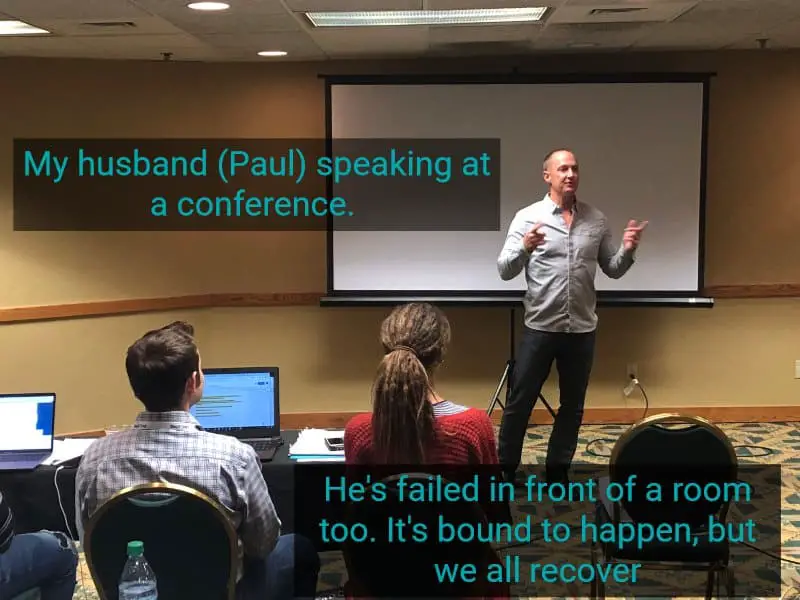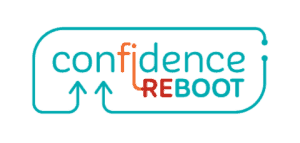
Updated April 5, 2023 – When public speaking goes wrong, it’s hard to know what to do. Recovering your poise and confidence can seem impossible. When I failed my first public speaking opportunity, it went like this.
I stood in front of the room. The audience’s eyes were all fixed on me. I was shaking on the inside.
I didn’t want to sound like a total loser. I began to sweat. With my heart pounding, I uttered the first words, and then it happened.
I burst into tears.
The only thing I knew to do was to continue speaking through the tears. I wanted to crawl under a rock. How would I ever stand in front of a room again? I needed to see what it would take to regain my confidence after this public speaking failure, and once and for all put my fear of public speaking in the past.
That was years ago, and over time I have become a more confident public speaker and found ways to recover after situations like this.
So how do you regain confidence after a public speaking failure? If you have a bad experience during public speaking, the best way to regain confidence is to go easy on yourself, recognize that we all have the right to learn. The failure says nothing about you as a person, and you should try again.
The embarrassment can run deep after you fail in front of others, and telling ourselves that it’s all okay is easier said than done. How can you let go of past failure and stop rehearsing the event in your head?
Becoming confident, successful speakers takes a bit more than simply wishing stage fright and fear of failure away. In this article, I will be sharing some practical tips to get out of the funk of
Table of Contents
Why We Fear Public Speaking
Only about 10% of people love public speaking. They describe it as a rush. Unless you are in this 10%, you are like the rest of us, who would rather die than get up in front of a room of strangers.
What’s the reason, most of us would prefer hanging back? It’s simple. In front of a room, we are exposed, vulnerable, and on display for judgement and assessment. What if our worst fears about who we are and who we are not are all true?
You may not have experienced low self-esteem, but I have. I think my forehead is too big, my nose too wide, one of my eyes slopes a bit differently than the other. Give me a mirror and a room and I can give you all the reasons I shouldn’t be upfront.
The reason it’s so easy to fail when we tackle public speaking is
The problem is that when we get up in front of a room and our goal is to not sound or look bad, we begin to worry about the wrong things. This consideration puts on our brains on hyper-drive, and brain freeze is often on the horizon.
We become so fixated on not sounding or looking bad that we fail to connect with the humanity of our audience. When you are really present in your public speaking, you may find that the “self” starts to fall away.
It’s like tennis. When you
When you get your head around the fact that we are all dealing with the same thing, i.e. trying not to look bad, you will find it ushers in some freedom to just “be.”
Otherwise, a public speaking failure can result in a major loss of self-confidence.
What Is The Hardest Part About Public Speaking?
Without a doubt, the hardest part about public speaking is a combo of fear of failure and simply getting up there in front of a crowd and starting to talk. Remember my personal experience from the beginning of this article? I took the first step and got up there, but it all fell apart soon after.
The first 15 minutes of the speech is where most people struggle – even the confident speakers. This is often when your nerves kick in and you can feel anxious about what will come next. Will the audience be receptive? Will you remember your key points? Are there any wardrobe malfunctions waiting to spring themselves on you?
It’s important to do some deep breathing before starting, and remind yourself that the audience is on your side. Practically every audience member has stood in front of a group at one time or another, so they pretty much can identify and sympathize with your speech anxiety.
You can also focus on delivering each point clearly and confidently, no matter how nervous you might be. With enough practice and preparation, you’ll be able to conquer this fear and effectively deliver your speech without a hitch.
How Do I Overcome Public Speaking Anxiety?
A public speaking failure can even result in our experiencing anxiety when we see others get up front of an audience.
Have you ever felt that way? Someone else gets up to speak and you are nervous for them?
Recovering from a public speaking failure requires introspection and self-acceptance. If you grew up in a similar environment as I did, introspection may turn into self-deprecation and self-acceptance is akin to a fairy tale. How do you stop playing the wicked step-mother on yourself?
Everything that happens to you is a reflection of what you believe about yourself. We cannot outperform our level of self-esteem. We cannot draw to ourselves more than we think we are worth.
Iyanla Vanzan
It’s important to understand that you are unique.
Since none of us can readily outperform our self-image, we have to change it.
My mentor taught me that one way to change your self-image is to begin to look at others and notice what you admire about them.
Practice trying on that trait. For a
Finally, it’s normal to fail. As toddlers, we failed when taking our first steps. But over time, with the right environment and encouragement, we learned to walk. Consider that the human experience is about learning and growing.
Anyone who stops learning is old, whether at twenty or eighty. Anyone who keeps learning stays young. The greatest thing in life is to keep your mind young.
Henry Ford
It’s okay to fail, and failing is just a part of learning. We all have the right to learn.
How Common Is The Fear Of Public Speaking?

As we discussed above, only 10% of the population has any real excitement around getting to speak publicly, which leaves the rest of us at least at a mediocre level of wanting to get up in front everyone.
I have done public speaking for years now. In some of the personal growth courses I have taken, it was encouraged for us to get up and share. I found the best way to share was authentic about my need for everyone to appreciate what I was saying.
Once I got that out of the way, it helped me focus on what needed to be said.
But with all of that experience, I still get stopped.
Recently at my wedding rehearsal dinner, I realized that catering had forgotten to provide enough vegetarian food for my closest friend and
I had to get everyone’s attention and make a request that they would leave extra non-meat dishes for the vegetarians who had not yet eaten. Even at that moment, I found my heart began to flutter.
Stopping a party, still required something. That something showed me how uncomfortable public speaking can be even when you know everyone in the room.
It’s more than normal to be concerned about public speaking. It is actually more unique not to have any qualms about public speaking.
So, if you are concerned with your inability or fear of it, consider yourself surrounded by like-minded people. Most of us feel the same way.
How To Speak In Public Without Fear
When it comes to the fear of public speaking, the fear part is usually all about a sense that you will lose power, won’t speak appropriately or clearly, and will end up looking bad.
To combat this, you will need the sense of uninhibited full self-expression.
What’s the best way I’ve seen to get connected with your inner Jedi?
Remember when you were a kid and used to talk too much or did stuff that you got in trouble for? You weren’t worried about anything, right?
This the mindset that we should adopt to cope with our next speaking engagement whether planned or impromptu.
A confident mindset starts by reminding yourself that nobody is perfect, and you’re not alone in making mistakes. Every successful person has failed at some point. It’s how you learn from these failures and prepare for the future that matters.
Focus on positive self-talk — tell yourself “I can do this! I am capable of succeeding!”
You should also think about the things you did well during your last speech, rather than giving so much attention to what didn’t go right. This will give you hope and encouragement as you move forward with your next speech.
That said, there are some other simple tricks that can help with your confidence levels.
- Create an outline of your speech (basically, just list the main points) and run through several practice sessions in front of a mirror before your public speaking event. Speaking out loud allows you to catch mistakes early on and familiarize yourself with the material.
- Another simple way to help with your nerves is by having supportive friends or family present in the audience while you’re speaking and then making frequent eye contact with them.
- Deep-breathing exercises can also be extremely effective when calming your public speaking fear before heading to the podium.
If none of these tips help your anxiety levels, you may want to consider professional help from a therapist or doctor. Anxiety medications can reduce symptoms and make public speaking easier to cope with.
How Do I Stop My Voice From Shaking When Public Speaking?
The first thing to remember when it comes to speaking in public is that it’s natural to be nervous. Just about everyone gets a case of the jitters before taking the stage, so don’t worry if you’re feeling some butterflies. The important thing is addressing those nerves head-on and channeling them into something positive.
Start by focusing on your breathing – take slow, deep breaths and try counting as you inhale and exhale. This helps bring your heart rate down and gives you a few moments to pause and quiet your mind before diving into your presentation.
You can also practice relaxation techniques like mindfulness meditation or progressive muscle relaxation to help calm any anxiety you may have before getting up there.
Remember that everyone messes up – even the most famous and confident of public speakers. It’s part of being human and it doesn’t define you or your potential.
Failing once also doesn’t mean that you’ll never succeed – in fact, some of the most successful people in history have also experienced countless failures. So don’t be afraid to try again, but keep practicing and refining your presentation until you get it right.
And lastly, remember that practice makes perfect. Writing out your speech and rehearsing it multiple times will help immensely when it comes time for the real thing.
Don’t forget to practice speaking aloud with someone else, too – this can give you valuable insight into any areas where you need to work on your delivery and timing.
The Tool To Stop The Fear In Its Tracks
Years ago I read a book called, “The Tools” by Phil Stutz & Barry Michels. They had a piece of advice that I still think is one of the most amazing ways to get over being shy.
Their recommendation was to think of the “little you” when you have to get up on stage.
It might sound strange to consider the “little you” powerful but I’ll explain.
Picture yourself as a young child. Let’s call it the inner you or shadow. Recognize that the young child in you is uninhibited by what people think.
When you speak in front of an audience, you can picture yourself with your shadow next to you so that when you address the audience, you display courage and ability to set aside what others may be thinking.
This gives your message, delivery and poise congruence, strength and power from a much deeper source than you may be familiar with.
When you stand shoulder to shoulder with the part of yourself that is like a kid who is unrattled by being made a spectacle, you will find yourself speaking from a place of uninhibited self-expression. That new perspective can help build your confidence, even if you don’t possess a confidence “gene” at that point in time.
Final Thoughts
A lot of people are nervous public speakers, so you’re not alone! The good news is that regaining confidence after a public speaking failure is possible with the right preparation and support.
Hone your presentation skills beforehand, make sure that you are confident in your material and be prepared for any unexpected turns. Reach out to your friends and family for their support throughout this journey so that you can rise again and succeed with flying colors. Don’t forget: You’ve got this!
